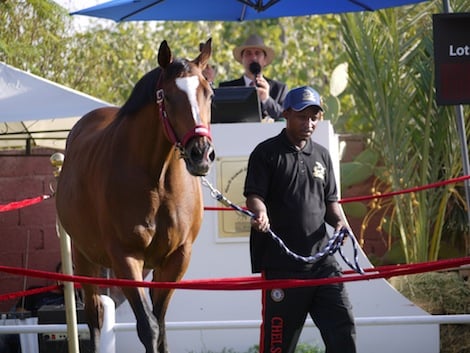By George Grant.

Tajoura, 14 October:
Panama hats, blazers and racehorses are not items often associated with post-Qaddafi Libya these days, but all . . .[restrict]three were on offer in abundance at the 6th National Mixed Thoroughbred Sale in Tajoura yesterday.
As some of Libya’s finest gathered to bid for racers and breeders alike, horses from as far afield as Australia, England and the United States exchanged hands for as much as 50,000 dinars – a fraction, it is said, of what can be achieved in better economic times or if the Emirates are in attendance, which sadly they were not.
Higher prices are also expected to be obtained at today’s silent auction, the rationale being that it’s better for the neighbours not to know quite how much money each other have got.
And silent yesterday’s proceedings certainly weren’t. As snacks were munched and pleasantries exchanged, two young men perched atop upturned boxes engaged in periodic acts of wild gesticulation and yelling, apparently to inform the fast-talking and immaculately tailored auctioneer that another bid had just been placed.
“We have 33 horses for sale today”, says Abdulrahman Isaadi, brother-in-law of the auction-owner – and auctioneer himself – Amad Alshaab.
“Things are moving, but not as well as we’d like. A little under half the horses have sold, and the prices are not as high as we might see in better times”.
Walking round the stables, and having been reprimanded for venturing across the paddock en route, this correspondent encountered fillies, colts, mares and stallions with a variety of imaginative names, including an enormous stud horse ominously known as Brut Force.
A multiple winner in his day, Brut Force commands a ‘stud fee’ of 2,000 dinars, although his form may now be on the wane; Churchill Downs, the excitable stud in the neighbouring stable, commands a fee more than twice as large.
Every single mare in the house, it transpires, is pregnant.
“The younger horses sold to day will be trained as future racers, whilst the older ones will be used for breeding back at the farms and private stables”, says Malek Ramadan, one of the organisers.
“It’s not yet Europe or Ireland, but Libyan horseracing is definitely getting there. You can go down to Bu Seta racecourse in Tripoli and it is a mix of wonderful colours and occasion. It’s clean and everything is very well organised”.
Having witnessed what was on offer at Tajoura yesterday, that doesn’t sound like a bad proposition. [/restrict]








